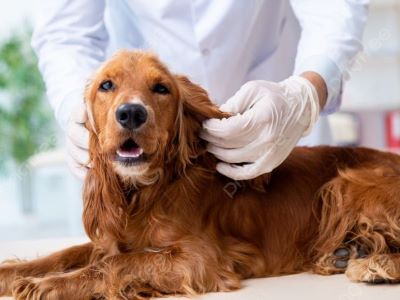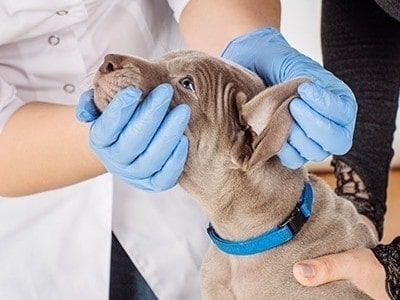Can kennel cough kill a dog? This question often lingers in the minds of pet parents. Kennel Cough is a highly contagious respiratory disease that affects dogs. Understanding the severity of Kennel Cough is crucial.🐶

In this guide, we will delve into the causes of Kennel Cough, its symptoms, risk factors, potential complications, and most importantly, whether Kennel Cough can be fatal.
We will also explore preventive measures as well as available treatments. By gaining a thorough understanding of Kennel Cough, we can better protect our canine companions.🐕
Can Kennel Cough Kill a Dog?
“Kennel cough, also known as canine infectious respiratory disease (CIRD) or infectious tracheobronchitis, is a highly contagious respiratory disease in dogs. Kennel Cough is characterised by inflammation of the upper respiratory tract, particularly the trachea (windpipe) and bronchi (airways leading to the lungs)”, confirms the expert at PetMD.
It earned its colloquial name due to its frequent occurrence in places where dogs are in close contact, such as kennels, dog boarding facilities, and shelters.🏠
Causes and Pathogens
Understanding the bacterial and viral agents responsible for Kennel Cough and how it spreads aids in implementing effective preventive measures.🦠
Kennel Cough, or canine infectious tracheobronchitis, is primarily caused by a combination of bacterial and viral agents. Understanding these pathogens is essential:
- Bordetella bronchiseptica: This bacterium is one of the most common culprits behind the Kennel Cough. Bordetella bronchiseptica infects the respiratory tract, particularly the trachea and bronchi, leading to inflammation and irritation[1]. It’s highly contagious and can survive in the environment, making it a persistent threat in places where dogs congregate.🦠
- Canine Parainfluenza Virus: This is a significant viral contributor to Kennel Cough. It attacks the respiratory system, causing symptoms such as coughing, sneezing, and nasal discharge[2]. While it’s less severe on its own, it often acts in concert with other pathogens, exacerbating the disease’s impact.

- Other Potential Pathogens: Besides other virus, Kennel Cough can also be triggered or complicated by other infectious agents. These may include canine adenoviruses, canine distemper virus, and Mycoplasma spp. These agents can add to the severity of the disease and increase the risk of complications.
How It Spreads?
Understanding how Kennel Cough spreads is crucial for preventing its transmission and managing outbreaks:
- Airborne Transmission: Kennel Cough spreads primarily through the air. When an infected dog coughs, sneezes, or even barks, tiny respiratory droplets containing infectious agents are released into the environment. These droplets can travel short distances and remain suspended in the air, allowing other dogs to inhale them.
- Dog-to-Dog Contact: Close contact between infected and uninfected dogs can also facilitate the spread of Kennel Cough. This can occur through activities like nose-to-nose greetings, shared toys, or even communal water bowls. Dogs in densely populated environments, such as kennels and shelters, are particularly susceptible to this mode of transmission.🧼
- Contaminated Surfaces: Kennel Cough pathogens can survive on surfaces for varying durations. Dogs can become infected by coming into contact with contaminated objects such as bedding, toys, or common areas within kennels. Proper sanitation and disinfection practices are essential to minimize this form of transmission.
- Asymptomatic Shedding: Infected dogs can sometimes shed pathogens even if they do not display visible symptoms. This makes identifying and isolating affected dogs more challenging and underscores the importance of vaccination and regular health checks.🩺
Kennel cough, while generally mild and self-limiting, can potentially lead to severe complications or prove fatal in rare cases, especially for vulnerable dogs.🐶 Therefore, it’s crucial for pet parents to monitor their pets and take preventive measures such as vaccination💉 and proper hygiene to reduce the risk of transmission.

Symptoms of Kennel Cough
Kennel Cough, or canine infectious tracheobronchitis, manifests through a range of symptoms that can vary in severity. Understanding these symptoms are essential, so here are some of them:
1) Coughing
Kennel Cough is most renowned for its distinctive dry, hacking cough. This persistent cough often sounds like a honking noise and can be triggered or exacerbated by excitement, exercise, or pressure on the dog’s trachea. The coughing can be quite persistent, leading to discomfort and exhaustion for the dog.🐕
2) Sneezing
Alongside coughing, sneezing is a common symptom of Kennel Cough. Dogs with this illness may exhibit frequent and forceful sneezing. Sneezing🤧 serves as another means by which the infectious agents responsible for Kennel Cough can be expelled into the environment, contributing to its contagiousness.
3) Nasal Discharge
Dogs with Kennel Cough may experience a runny or congested nose. This discharge can vary from clear to thicker, yellowish mucus. Nasal discharge👃 is often accompanied by other respiratory symptoms and can contribute to the dog’s discomfort.
4) Fever
A fever is the body’s natural response to infection. While not always present, dogs with Kennel Cough may develop a mild fever as their immune system attempts to combat the invading pathogens.
Monitoring the dog’s temperature can help assess the severity of the infection.🦠
5) Lethargy
Lethargy is a common symptom in dogs with Kennel Cough. The persistent coughing and discomfort can leave the dog feeling tired and less energetic than usual. Rest and reduced activity are often necessary during the recovery period.
6) Loss of Appetite
Dogs with Kennel Cough may exhibit a decreased appetite. The irritation in the throat and respiratory tract can make eating less appealing. Maintaining hydration and nutrition becomes important during the illness to aid recovery.⛑️
Risk Factors
Several risk factors can influence the likelihood of a dog contracting Kennel Cough and the severity of the disease if they do become infected. Understanding these risk factors is essential, so here are some of them:
Age
Age plays an important role in such diseases, here is how:
- Puppies: Young puppies are at an elevated risk for Kennel Cough due to their developing immune systems. Their immune responses may not be as robust as those of adult dogs, making them more susceptible to infections.

- Elderly Dogs: Older dogs, particularly those with age-related health issues, may also be more vulnerable to Kennel Cough. Their immune systems may not function as efficiently as they did in their prime.
Vaccination Status
As this is a very prominent factor in preventing this, let’s look into the details:
- Unvaccinated Dogs: Dogs that have not been vaccinated against Kennel Cough are at a higher risk of contracting the disease. Vaccination💉 can provide some level of immunity, reducing the severity of symptoms if infection does occur.
- Incomplete Vaccination: In some cases, dogs may have received partial or outdated vaccinations, leaving them partially unprotected. Ensuring that your dog’s vaccinations are up-to-date is critical for disease prevention.
Environment
Environment plays an important role, here is how:
- Crowded Spaces: Dogs in environments where they are near other dogs, such as kennels, shelters, doggy daycares, or boarding facilities, face an increased risk. The close quarters and shared air can facilitate the spread of the disease.🧫
- Travel and Exposure: Dogs that frequently travel, attend dog shows, or interact with unfamiliar dogs in public spaces are also at higher risk due to increased exposure to potential carriers of the infection.
- Stress: Stress weakens the immune system’s ability to fend off infections. Dogs subjected to stressful situations, such as changes in their routine, travel✈️, or emotional distress, may be more susceptible to Kennel Cough.
- Immune System: Dogs with compromised immune systems due to underlying medical conditions or medications may be at greater risk. Chronic illnesses or immunosuppressive medications can hinder the body’s ability to fight off infections effectively.
Warmer environments with stagnant water sources can increase exposure to gnats and midges. Protect dogs from biting insects that may carry other diseases. Check our guide on, "how to keep gnats off dogs" for information.
Prevention and Treatment
Preventing Kennel Cough and providing effective treatment are essential aspects of canine health management. Here’s an informative expansion on each of these components:

Vaccination
Dogs should receive regular vaccinations against Bordetella bronchiseptica, canine parainfluenza virus, and other relevant pathogens. There are different types of Kennel Cough vaccines, including injectable, intranasal, and oral forms[3].
Your veterinarian will recommend the most suitable option based on your dog’s age, health, and lifestyle. Keep up with booster vaccinations, as immunity may wane over time. For dogs in high-risk environments, such as boarding facilities or dog shows, more frequent boosters may be necessary.
Hygiene and Sanitation
Regularly clean and disinfect your dog’s living space, including bedding, toys, and food/water bowls. This reduces the chances of pathogens lingering in the environment.🌍
After handling multiple dogs or visiting places with many dogs, practice proper hand hygiene. This prevents you from inadvertently transmitting the disease from one dog to another.
Quarantine and Isolation
If your dog displays Kennel Cough symptoms, isolate them from other dogs to prevent further spread. Consult your veterinarian for guidance on the duration of isolation.
Dogs newly introduced to your household or those returning from kennels or shelters should undergo a short quarantine period to monitor for symptoms before interacting with resident dogs.🐶

Veterinary Care and Medications
Early detection allows for timely treatment. While Kennel Cough typically resolves on its own in healthy dogs, your veterinarian may recommend medications to alleviate symptoms or manage secondary bacterial infections.
These may include cough suppressants, antibiotics, and anti-inflammatory drugs. Ensure your dog gets plenty of rest and stays hydrated during their recovery. This aids the immune system in fighting off the infection.
According to the AKC, antihistamines can be used to ease the symptoms of kennel cough in dogs. Kennel cough is a highly contagious respiratory disease in dogs that is caused by a variety of viruses and bacteria.
Regularly follow up with your veterinarian to monitor your dog’s progress. If the symptoms worsen or persist, seek immediate veterinary care.🥼
While Kennel Cough typically resolves on its own in healthy dogs, your veterinarian may recommend medications like antihistamine for dogs to alleviate symptoms or manage secondary bacterial infections.
FAQs
How Long Does a Kennel Cough Last?
Symptoms of kennel cough usually take 3-14 days to develop and then last for 1-3 weeks. Most dogs develop a hacking cough and stay otherwise quite well, but puppies, older dogs, and poor dogs can develop more serious symptoms such as Reduced appetite. Low energy (lethargy)
Can Kennel Cough Kill a Dog?
The good news is that kennel cough is usually not fatal. Most dogs recover just fine from the condition, although many will be quite uncomfortable from the associated coughing and sore throat while the disease is active. In rare cases, the disease can progress to pneumonia, which actually may lead to death.
What Happens if Kennel Cough Goes Untreated?
While a nuisance, kennel cough is not normally dangerous and is likely to need no treatment at all. But in puppies, elderly dogs or those with existing illnesses, the condition can be more serious and can develop into pneumonia.
Summary
In conclusion, Kennel Cough is a contagious respiratory disease that, while typically mild in healthy dogs, can pose a significant risk to vulnerable populations, including puppies and older dogs.🐶
While it rarely proves fatal in robust adult dogs, severe complications like pneumonia can potentially be life-threatening. Monitoring your dog’s health, seeking timely veterinary care for symptoms, and following preventive measures are crucial steps to safeguarding your furry companion’s well-being.❤️🩹
If your dog develops kennel cough, speaking to your vet about treatment options such as antibiotics, cough suppressants, or best antihistamine for dogs uk, may help ease their discomfort
So, to answer the question, “Can kennel cough kill a dog?” while uncommon, it can pose a risk, emphasizing the importance of vigilance and preventive actions.🐾
Reference:
- Professional, C. C. M. (n.d.). Bronchiectasis. Cleveland Clinic.
- Coughing and Sneezing (n.d.)- CDC
- Tonozzi, C. C. (2023, August 22). Kennel Cough. MSD Veterinary Manual.



